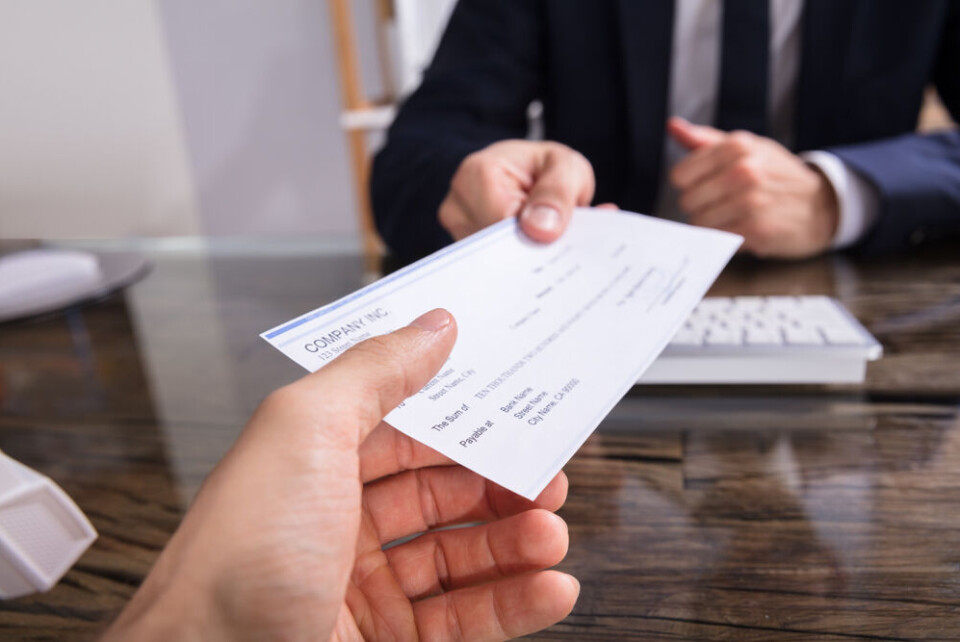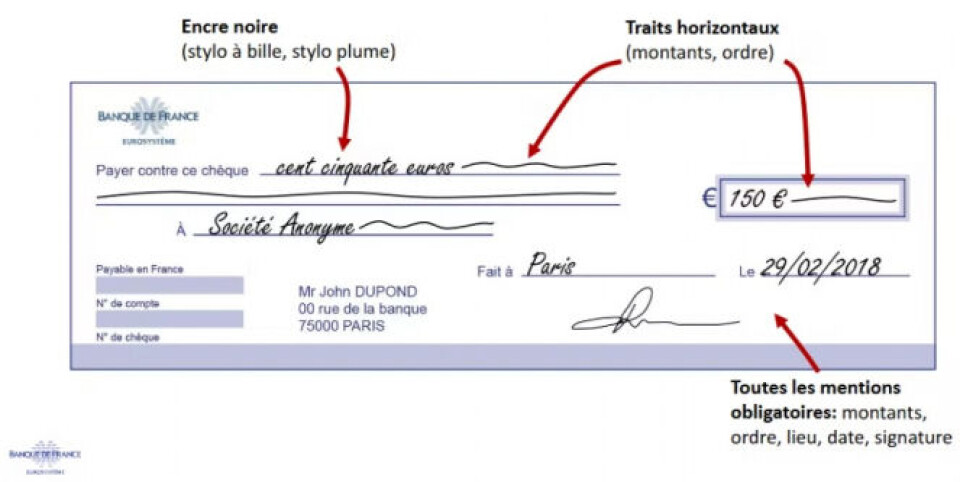-
Travellers risk extra costs under new Eurotunnel ticket rule
Some fare options are less flexible and less forgiving of lateness
-
May will be difficult month for train travel in France, warns minister
Two major train unions are threatening to strike and are ‘not willing to negotiate’, he says
-
Larousse dictionary adds 150 new French words - which ones do you know?
The new words come from trends in sport, nature, leisure, food, medicine, and the rest of the French-speaking world
Cheque fraud on rise in France: Tips on how to avoid it
Cheque fraud amounted to €538million in 2020, the latest annual report shows, prompting La Banque de France to step up security and offer tips to avoid falling victim

Cheque fraud is on the rise in France and was the most-defrauded form of payment in 2020, the Banque de France has warned, prompting it to increase security and offer tips on how to avoid it.
The central bank is stepping up security on bank cheques after the number of fraudulent cheques rose by 20% in 2020, according to the most recent annual report by payment security agency l’Observatoire de la sécurité des moyens de paiement (OSPM).
Cheque fraud amounted to €538million (42%), compared to €473million (34%) for bank card fraud, and €267million for online transfers (21%).
Fraud levels are the highest of all types of payments, at 0.088%. This means that for every €10,000 paid, €8.80 is fraudulent. Cheque fraud was also the only method to have significantly risen last year.
In response, the Banque de France has called for banks to “strengthen monitoring of fraudulent cheques”, including by:
- Improving the fight against lost and stolen cheques
- Strengthening the security of chequebook delivery
- Boosting the quality of stop payment procedures
- Sharing more tools for the checking of cheques
- “Maintaining vigilance" over the physical characteristics of cheques in order to "limit the risks of forgery and counterfeiting".
How to increase cheque security
The central bank has also offered tips to individuals on how to increase the security of cheques. It advises:
- Writing with a permanent black biro or other permanent pen or marker;
- Filling in all the compulsory information (amount in words and figures, order, signature and date and place of issue)
- Draw horizontal lines after your writing so as not to leave any free space on the order or the amount;
- Avoid any erasure or overwriting that could invalidate the cheque
- If you are sending a cheque by post, let the recipient know in advance and ask them to tell you when they have received it. If they do not receive it, contact your bank to let them know and warn them of a possible fraud risk.
For extra security, you can also stick a transparent piece of tape over the parts of the cheque that show the amount, and the recipient’s name, to avoid the possibility of any changes after you have filled it out.

Image: Banque de France
How can I protect cheques from loss or theft?
- Do not lend your cheques to anyone, not even to your family
- Keep them in a safe place, "if possible separately from your identity papers", says the Banque de France.
- Do not sign cheques in advance or keep them blank
- Collect new chequebooks directly from your bank branch rather than by post.
If you find that your cheque or chequebook has been lost or stolen, you must immediately contact your bank using its emergency number, or online, and stop all payments from that book.
In the event of theft or fraud, you must also lodge a complaint with the gendarmerie or police station, and you may be required to send a registered letter to your bank confirming that you wish to stop payments. Stopped payments are recorded in le fichier national des chèques irréguliers (FNCI).
How should I safely cash a cheque?
- When you are paid by cheque, ensure that all compulsory information is correct and consistent with what you know about the payer.
- Pay in the cheque as soon as possible.
- Do not accept or cash cheques that do not correspond to what has been agreed, such as the amount.
- Never accept to cash a cheque on behalf of someone else.
The Banque de France warns: "This is illegal and very dangerous because fraudulent cheques will be rejected after a few days. You may unwittingly become an accomplice to fraud and find yourself overdrawn.”
Related articles
Fees, fraud, debt: How bank clients can get help in France
France scam alert: Watch out for fake emails about inflation bonus
New scam alert: People in France warned about banking 'spoofing'
























